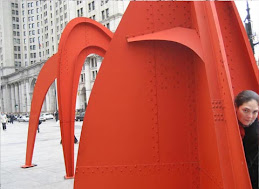Hiroshima, Japan-- Goodbye Japan! Wow, what a country. Sitting in the small yet comfortable Hiroshima airport, Betz and I have a couple hours to reflect on the whirlwind that was the last two weeks. We have visited Tokyo, Mt. Fuji, Hakone, Kawaguchiko, Kyoto, Osaka, Hiroshima and Miyajima, yet I feel like I barely know the country at all. In fact, coming here has raised more questions about the people and culture than it has answered.
.JPG) |
| The tori at Miyajima |
First, I should say that I have the utmost respect for Japan. It amazes us to see how orderly, controlled, caring and considerate the people here are (with the possible exception of Osaka, which we found to be a giant urban mess, full of electronic stores and anime porn shops). They wait in line, offer help with directions unsolicited, step aside to let foreigners go first, smile to strangers and say "arigato gozaymas" everywhere- meaning thank you very much. Japanese seem to be hyper aware of their surroundings and of others. Rarely do they touch each other, even on crowded subways. They walk (and drive) on the left side of the street, never bumping into each other. Though they rarely seem outwardly happy, we haven't seen anyone mad at all. They are respectful and reserved. They speak in low voices and obey rules regarding cleanliness and quiet hours. When we stayed in ryokan, the lower help (cleaning service usually) would hide behind curtains or plants when they saw us coming. They are efficient and smart and always looking for ways to lend a helping hand.
 |
| Low tide, we walked right through it. |
The country as a whole is a bit harder to quantify. There seem to be a bunch of contradictions here that we just couldn't solve in two weeks. We found that much of Japan's reputation holds true, however the manifestations are completely different from the image in my mind's eye before I came. The ultramodernism, honor code, cleanliness, efficiency, historic culture, consumerism, kitschiness, kinship with nature, Zen, fashion, gender roles, and spirit of Japan all hold true to their stereotypes. Yet, when walking down the street of a typical Japanese city, you could imagine it being anywhere in the world.
Perhaps it is the after effects of WWII, which left Japan completely bombed out, but the wonderful traits that Japanese culture are steeped in fail to produce a cohesive and beautiful urban form (except Hiroshima which is beautiful). The Japanese attention to EVERY detail seems somehow fails to miss the big picture on a citywide scale. Streets often are so narrow, treeless, and filled with wires, that they feel more like American back alleyways (they usually don't even have sidewalks). The central cores of the cities establish very little hierarchy and are often unimportant, leaving the image of the city to be piecemeal--again focusing on a specific shrine or rail station. Kyoto was the prime example of this, with its myriad beautiful temples on the outskirts and virtually nothing of value in the central city. I have learned a lot about architecture and space here, yet very little about urbanism.
 |
| Konichiwa! |
There are other apparent contradictions as well. The Japanese are obsessively clean, yet finding a public garbage can be difficult--which makes having so much packaging seem suspect. The use of parasols to block the sun and rain is ubiquitous, yet finding a tree-lined street is a rarity. When we went to the fireworks show, millions of people waited patiently for five or six hours to reserve spots that weren't even within view of the fireworks. There is such a minimalist approach, yet consumerism is so over-the-top that we often found ourselves overwhelmed. There are many gardens and parks, but no benches to sit and enjoy them. And of course the whole sex culture is baffling, with everyone seeming so conservative yet prostitution / anime sex joints are found everywhere, mingled among restaurants and libraries and electronic goods stores.
Overall, we have enjoyed our time in Japan immensely and would recommend a visit to most anyone-- so long as you are open to sitting on the floor, taking your shoes off everywhere and don't mind trying bizarre food. We found keeping kosher challenging, but not overwhelming. I can say easily that the cultural barrier is much less hard to navigate here than it was in China--and the experiences make the trip well worth it.
So, sayonara Japan. You have been great. Up next is a quick 2 days in Cambodia before landing in Thailand. Sawahdeekup (hello in Thai), we look forward to discovering your many cultural experiences.
 |
| Mmmm. Maple cakes with red beans! |
.JPG)
.JPG)

.JPG)
.JPG)

.JPG)



.JPG)



